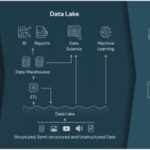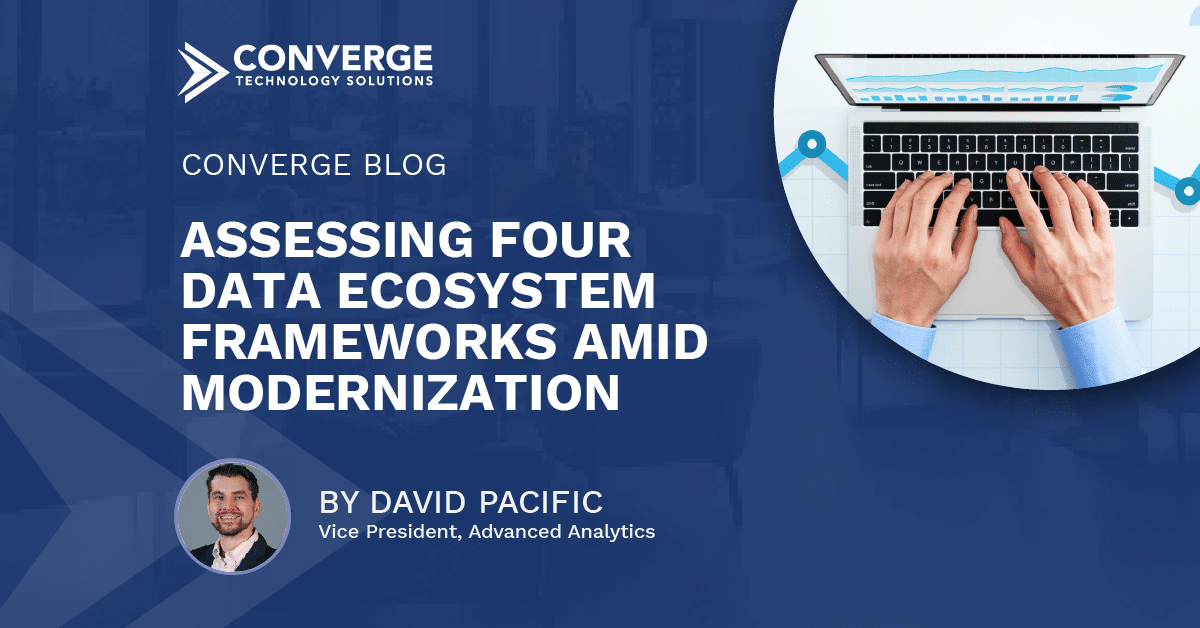As organizations strive to keep pace with the ever-changing data and technology landscape, they are turning to modern data ecosystem frameworks to help them modernize their data governance and architectures.
These frameworks provide a usable blueprint for building a flexible and scalable data architecture that can accommodate the ever-changing needs of the business.
Several different data ecosystem frameworks are available, such as data warehouse, data lake, and data mesh, each with its own strengths and weaknesses.
Choosing the right framework for your organization’s data ecosystem will depend on various factors. These factors include the size and complexity of your data architecture, your budget, and your team’s skills and experience.
No matter which type of data framework you choose, implementing a data ecosystem framework will require a significant investment of time and resources. But, with the right team behind you and good execution, it can pay off in a more agile and adaptable data architecture that can better meet the changing needs of the business.
Before we delve into the types of data ecosystem frameworks, it is important to know and understand the data ecosystem and why businesses should create a data ecosystem.
What is a Data Ecosystem Framework?
A data ecosystem refers to the interconnected system of technologies, processes, and policies that enable the data collection, storage, analysis, and exchange of data within an organization or across multiple organizations. See more information on Converge’s Business Analytics and Data Visualization.
The data ecosystem comprises various elements such as data sets, data storage, data analytics, data visualization, data exchange, and data privacy policies.
The emergence of big data has made it imperative for organizations to develop a comprehensive data ecosystem that leverages the full potential of data.
With the advent of new technologies and tools, it has become easier to collect, store, and analyze data, which has made it possible for businesses to optimize their data assets and data strategy and create data-driven systems to gain a competitive edge.
Building a data ecosystem provides organizations access to data to gain a competitive edge by unlocking insights from vast amounts of raw data. Organizations leverage data to make informed decisions, enhance their operations, and better understand their customers.
Why Should Businesses Create a Data Ecosystem?
In today’s data-driven world, businesses that fail to create a comprehensive and proper data ecosystem risk falling behind their competitors. A well-designed data ecosystem helps firms in the following ways.
Optimize Data Assets: A data environment enables your organization to optimize and manage data assets by collecting, storing, and data analysis. This allows you to gain insights into customer behavior, market trends, and operational efficiency within your organization.
Develop Data-Driven Strategies: A data ecosystem helps businesses to develop data-driven strategies that are based on real-time data and analytics. This enables organizations to make informed decisions that improve business outcomes.
Improve Operations: A data ecosystem enables organizations to improve their operations by leveraging insights from data analytics. This allows businesses to optimize their processes and enhance efficiency.
Ensure Data Privacy: A data ecosystem helps businesses to ensure data privacy by implementing policies and procedures that protect sensitive information. This enables businesses to build trust with their customers and comply with data privacy regulations.
To know more about data science in your organization, please read our blog Getting Started with Data Science in Your Organization.
Data Warehouse
The Advantages
For years, data warehouses have been the preferred framework for many organizations to collect and store data. These centralized repositories allow for easy access to the data, making them a good choice for organizations that need to support a large number of users and complex queries.
Data warehouses are designed to support reporting and analysis, making them a must-have for many businesses.
The Disadvantages
Data warehouses must be built and maintained, which can be costly. Despite providing a framework for businesses to act upon the data, these systems can be inflexible and struggle to keep up with changing business needs.
In addition, scaling the infrastructure can be difficult, which limits the usefulness of data utilities for organizations that handle large amounts of data. Another challenge is keeping track of data trails, which can be a complex task within the warehouse.
Data Lake
The Advantages
Meanwhile, data lakes offer a much more flexible data ecosystem framework than data warehouses. Data lakes can be used to store a wider variety of data types and can be more easily scaled to accommodate large amounts of data.
Data lakes can also be more easily integrated with other data sources, which can make it easier to keep up with changing business needs.
The Disadvantages
Data lakes can be challenging to manage and govern. This is because data lakes tend to be less structured than data warehouses, which can make it challenging to keep track of all the data that’s being stored.
Data lakes can also be more difficult to query, which can make it harder to get the information you require in a timely manner.
Data Lakehouse
The Advantages
Data lakehouses offer the flexibility and scalability of data lakes for cost-effective storage and analysis of vast amounts of data, while providing the structure and governance of data warehouses for effective management and analysis. They can support a wider range of data types and sources, including structured, semi-structured, and unstructured data, enabling easier integration of data from multiple sources for more comprehensive and accurate insights.
The Disadvantages
Implementing a data lakehouse can be complex and require specialized skills and expertise, which can pose a challenge for some organizations. Additionally, data lakehouses may still face some of the challenges of data warehouses, such as the need for careful data modeling and governance. Without proper governance, data quality issues can still arise, leading to inaccurate insights.
Data Mesh
The Advantages
Data mesh is a relatively new data management architecture that’s designed to address some of the shortcomings of both data warehouses and data lakes.
Data mesh uses a federated data architecture, which means that data is distributed across multiple data stores. This makes it much easier to keep track of all the data that’s being stored and to query it when needed.
The Disadvantages
Given that data mesh is a new data architecture, it’s in the early stages of development. As such, there’s much to learn about this type of framework.
Additionally, data mesh can require more of an investment to implement compared to data lakes, as it requires more specialized hardware and software.
Conclusion
There is no one-size-fits-all answer when it comes to data architecture modernization. It’s paramount to figure out and settle on a data ecosystem framework that fits your organization’s needs.
In need of data architecture modernization? Converge Analytics helps organizations tap into their data by leading with a mix of strategy and development expertise, using data science, machine learning & AI. Contact us now to learn more about how Converge can help your businesses achieve their goals.






